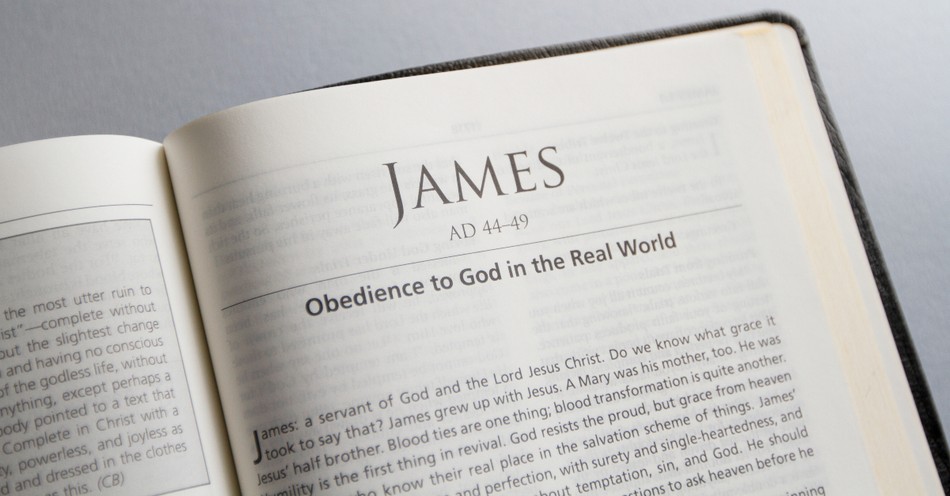Who Wrote the Book of James?
“James” is actually the result of a translation of the Jewish name Ya’akov and the Greek name lakobos. If you have ever heard the book of James referred to as the ‘book of Jacob’ that is why. James was not widely accepted until the 1600s when King James sponsored the translation called the “Authorized Version.” In Exodus 3:15, we read, “Say this to the people of Israel: Yahweh, the God of your ancestors-The God of Abraham, the God of Isaac, and the God of Jacob-has sent me to you.”
Jacob, or James, was a powerful voice in the early church, as well as the younger brother of Jesus (Galatians 1:9, Mark 6:3). He was an apostle of the church of Jerusalem. Many scholars believe that James did not become a believer until after Jesus died and rose again. Like Jesus, he was also killed for his faith around 60 A.D. according to Jewish historian, Josephus.
Context and Background of James
The book of James is a New Testament book that falls between Hebrews and 1 Peter. It is thought to be written between 45 and 47 AD and broken into three main themes that we will discuss in the next section. The intended audience of this book is thought to be targeted toward Jewish Christians. This is based on James’ comment, “I am writing to all the twelve tribes of Israel who have been sown as seeds among the nations.” His goal was reaching those who had converted from Judaism and were scattered throughout the Roman Empire to help them keep their newfound faith and strengthen it.
Main Theme and Purpose of James
There are three main themes in James: Wealth, Wisdom, and Trials. Per the Passion Translation Bible introduction, the themes are broken down as follows:
- Theme 1: Riches and Poverty – 2:1-26
- Theme 2: Wisdom and Speech – 3:1-4:12
- Theme 3: Trials and Temptation – 4:13-5:18
James uses Jewish traditions to draw out the wisdom they are used to hearing and applies it to practical Christian living. During this time, people were threated daily for this faith. He used this book as encouragement that the trials they would face would not be a waste and that spiritual maturity is born through perseverance. He takes the known Ten Commandments and frames it for the new life through Jesus as summarized in James 2:8. It says, “You must love and value your neighbor.” Finally, he shares a beautiful message of balance among all socioeconomic statuses. To the poor, he shared that they have been blessed with privilege and love. To the rich, he reminded them that no amount of deed or wealth could buy what they were freely given. He dispels unfair acceptance within the church while he is at it.
What Can We Learn from James Today?
As you will see from the verses below, the teaching of James is as relevant today as it was then. Charges of wisdom have no expiration and are not just a passing trend. We can read this book quickly for a spiritual recharge and reminder to remain close to God in righteousness and as a result, treat others well from that place. As we read today, we will be reminded to think of God’s great gift of mercy over our lives and how we can share that with others to point them to Him. We will learn the ways of pure and fruitful communication, proper handling of wisdom, conflict resolution, and even the simple key to victory over spiritual warfare.
Our Favorite Verses from James
James 1:9 - “The believer who is poor still has reasons to boast, for he has been placed on high. But those who are rich should boast in how God has brought them low and humbled them, for all their earthly glory will one day fade away like a wildflower in the meadow.”
James 1:19 - “My dearest brothers and sisters, take this to heart: Be quick to listen, but slow to speak. And be slow to become angry, for human anger is never a legitimate tool to promote God’s righteous purpose.”
James 2:13 - “...and remember that judgment is merciless for the one who judges others without mercy. So by showing mercy you take dominion over judgment!”
James 2:14 - “My dear brothers and sisters, what good is it if someone claims to have faith but demonstrates no good works to prove it? How could this kind of faith save anyone?”
James 3:5 - “And so the tongue is a small part of the body yet it carries great power! Just think of how a small flame can set a huge forest ablaze. And the tongue is a fire!”
James 3:13 - “If you consider yourself to be wise and one who understands the ways of God, advertise it with a beautiful, fruitful, life guided by wisdom’s gentleness. Never brag or boast about what you’ve done and you’ll prove that you are truly wise.”
James 4:1-2 - “What is the case of your conflicts and quarrels with each other? Doesn’t the battle begin inside of you as you fight to have your own way and fulfill your own desires? You jealously want what others have so you begin to see yourself as better than others. You scheme with envy and harm others to selfishly obtain what you crave.”
James 4:7 - “So then, surrender to God. Stand up to the devil and resist him and he will turn away from you.”
James 5:9 - “Since each of you are part of God’s family, never complain or grumble about each other so that judgment will not come on you.”
James 5:16 - “Confess and acknowledge how you have offended one another and then pray for one another to be instantly healed, for tremendous power is released through the passionate, heartfelt prayer of a Godly believer!”
Sources
BibleStudyTools.com, James
BiblicalArchaeology.org, James or Jacob in the Bible
The Passion Translation Bible, second edition
Photo credit: ©Sparrowstock


.jpg)

